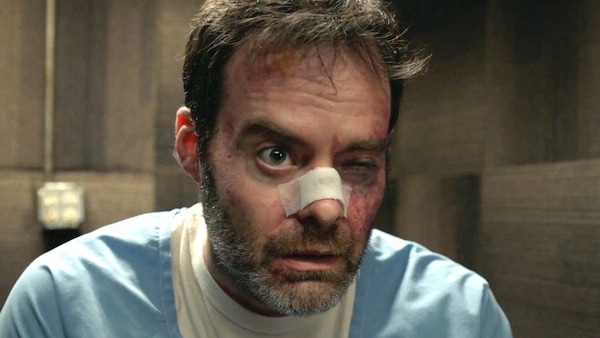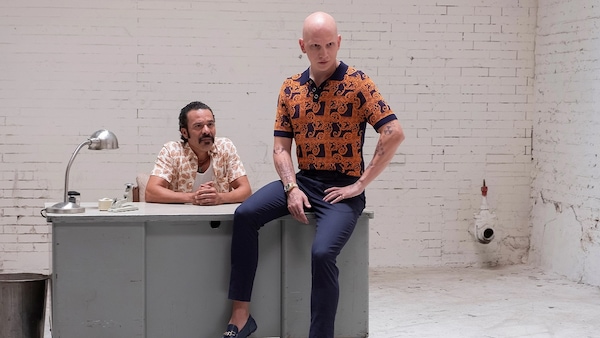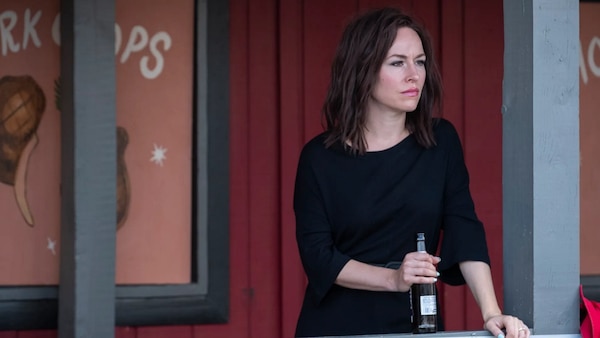Barry's S4 Reminds Us Why It's TV's Most Daring Dramedy
In its fourth season, Barry (created, written and directed by Bill Hader) takes great risks, muddles a few plotlines and comes out on the other side as TV’s most daring dramedy, writes Manik Sharma.

Last Updated: 05.56 PM, May 29, 2023
This column was originally published as part of our newsletter The Daily Show on May 29, 2023. Subscribe here. (We're awesome about not spamming your inbox!)
***
In a scene from the fourth and final season of HBO’s Barry, Cristobal Sifuentes — the lover of the series’ breakout character, NoHo Hank — gets buried in a pit of sand. It’s sand that the lovers have decided to work with, as a cleaner alternative to their cartel business. The scene is a stunning sequence that switches genres between comedy and tragedy in an instant as Stifuentes goes from casually surveying a storage facility to surreally being subsumed by its flooring. The banality of it all feels chilling, as the show yet again flips the tables on slapstick comedy with the bleakness of violence and sudden grief. In its fourth season, Barry (created, written and directed by Bill Hader) takes great risks, muddles a few plotlines and comes out on the other side as TV’s most daring dramedy.
In this fourth season, Barry finds himself in prison, having been tricked by his former acting mentor Mr Cousineau (an unforgettable Henry Winkler) into being caught. This seemingly sombre incarceration pushes the hitman to ultimately embrace the meaner side he has combated in the previous seasons to hilarious effect. Here the fiery overgrowth of resentment and anger finally takes over. In prison, Barry also reunites with his other father figure, Fuches, a character whose presence continues to screech at the show’s nobler intentions. Torn between working with and for father figures, Barry is also, quizzically undecided about his girlfriend Sally — ironically the most selfish person of the cast. Then there is Hank and his coterie in the distance, practising their love-hate relationship with the very idea of crime as a vocation.

Few shows as good as Barry over three seasons would push their entire canvas down the kind of agonising, provocative path that this last season does. High from exacting a form of revenge, Cousineau can’t help but bask in its tabloid-spinning glory. Even in grief, the artist can’t help but fetishise the wound he has been sentenced to live with. Sally, on the other hand, discovers a despicable inner self that only assists her in realising she is no more virtuous than her desperation for a career she most likely will never have. Both characters, at one point in thrall of Barry’s apathetic hard shell, can feel the cracks of his psyche reflect in the ways their own lives refuse to steer towards a catharsis of sorts. Are they really that different from each other?
Hank, the screen-stealing sensation, continues his rapacious pursuit of some sort of gangster glory. As a generational crime lord he must fulfil a legacy that also contests his lately established sexuality. It’s an inner battle that Hank eventually chooses to lose, so he can on the outside at least look like a conqueror. It’s a battle perhaps all of us choose to lose at some point or the other. No one makes it out of this fourth season endowed with a greater sense of purpose or enlightenment. Which is all the more baffling because despite intermittently spiralling into a self-serious comment about the consequences of violence and the tactile nature of grief, Barry is — quite astonishingly — very funny. It manufactures — out of the abundance of darkness and death — equity for light and life. The straight-faced drug-lords, the dispassionate FBI agents and the actors who ‘can’t help but act’ even their tragedies out make for an eerie mix of sensation and sensitivity.

In a scene from the last season, Cousineau, after he is courted by a journalist for his side of the Barry Berkman arrest story, play-acts a monologue as opposed to taking any questions. Narcissism has always been coded into the veins of this show for it uncovers in people their capacity for cruelty that’s far more craven and cunning than the simplistic, totalitarian pull of a gun’s trigger. Neither of these characters feel any more salvageable than the murderous protagonist and yet the show has succeeded in giving each of them purpose, and whimsy with an edge of despicability. Never before has a show packed so many bad eggs in one basket and forced us to love, care for and empathise with them all. The fact that most of them have lived on, as bodies have fallen around them, has added to their enigmatic, bleak sense of destiny. Indicative of the cruel fact that while nobody here is truly living, it takes a great deal of effort in this world at least, to also die with grace.
In its last season Barry loads the fuselage with more wattage and cheek than it has ever attempted before. Hader’s acting and writing aside, it’s his control as a director that has gone from a positive impression to imperious strength. Action sequences aren’t just rambling jigsaws of kinetics here, but carefully scripted augmentations of visual poetry. The camera rarely shakes, for there is a certainty to the deadpan nature of it all. There is no bungling of the thematic tone as the show refuses to lose shape, even after a risky redirection at the mid-season point. It indicates craft and control of an order that though it might have ceded the ground for a moral payoff has through the course of reaching its end never quite lost the ability to enthral, bemuse, maybe even hypnotise. It’s only fair then that it dares to dazzle, one last time. There was never a middle path with this show, as probably there isn’t to life either.
